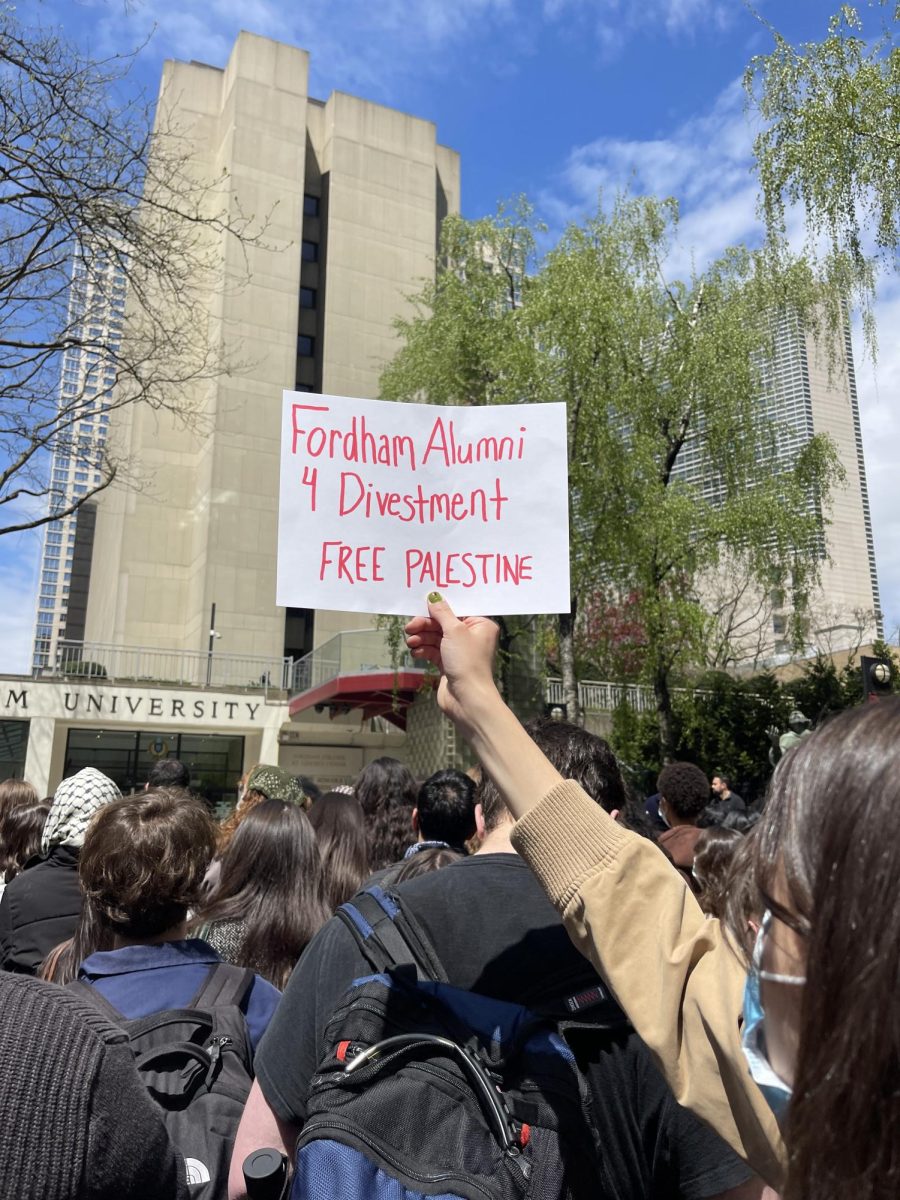University President Tania Tetlow announced the Socially Responsible Investing Committee (SRIC) on Oct. 4 to address student and faculty concerns about how Fordham invests its $1 billion endowment.
Tetlow’s announcement comes after environmentalist and pro-Palestinian student activists called for Fordham to disclose its investments and divest from major polluters and the defense industry respectively.
Once created, the committee will field suggestions from members of the Fordham community to ensure University investments align with Jesuit values, as stated in Tetlow’s announcement. The committee will then assess the University’s portfolio and present proposals to the Board of Trustees who will vote on whether or not to enact the committee’s recommendations.
The committee will be composed of 12 representatives from the Fordham community: two undergraduate students, two graduate students, two alumni, three faculty members, two administrators and a Jesuit. Geeta Kapeda, Fordham’s chief investment officer, wrote in an email that each member of the committee will be appointed by a relevant representative body — for instance, Rose Hill and Lincoln Center United Student Governments will appoint one student from each campus.
In addition to exploring the possibility of divesting from companies with unethical practices, the BAS considers avenues for environmentally friendly reinvestment.
In April 2024, a working group called Board, Faculty Advisors and Students (BAS) was formed to assess the University endowment’s exposure to potentially unethical industries, in particular fossil fuels.
Meredith Leahy, Fordham College at Rose Hill (FCRH) ’25, and Christian Hidalgo, FCRH ’25, leaders in the Students for Environmental Awareness and Justice club, are two of the three undergraduate students involved in BAS. Assessing Fordham’s investments proved to be harder than he expected due to the complicated structure of the University’s portfolio in different private and public investment funds.
The BAS group has met with representatives from the finance firms that manage the different funds that Fordham is invested in and reviewed selections of the University’s portfolio. In addition to exploring the possibility of divesting from companies with unethical practices, the BAS considers avenues for environmentally friendly reinvestment.
The BAS was expected to submit a proposal to the Board of Trustees in December 2024. However, Hidalgo and Leahy said the announcement of the SRIC has put that plan into question.
“It’s kind of thrown a bit of a wrench in our process, because now rather than just going directly to the board, we have to go to this group first, and then they will allow us to go to the board,” Hidalgo said.
In the process of reviewing Fordham’s endowment, members of the BAS have access to protected details about the publicly traded stock funds that Fordham is invested in. As these funds are engineered to perform better than the stock market average and generate a high return, the specific combinations of companies the funds are invested in is often secret. Members of the BAS privy to confidential investment information, including Hidalgo and Leahy, are therefore bound by nondisclosure agreements that bar them from discussing specifics of Fordham’s endowment.
Fordham declared $89.5 million in publicly traded securities on its 2022 tax returns, nearly half of what it held in 2021.
Leahy said that as other colleges and universities have taken steps towards divestment from fossil fuels, Fordham should be held to those same standards.
Leahy claimed that none of Fordham’s endowed money came from student tuition payments, instead coming from other sources such as donations. Despite this, Leahy said Fordham students still have a stake in where the University invests its money.
“Why wouldn’t you want Fordham University, the school that you proudly wear on your sweatshirt, to use its money for good and for social change,” Leahy said. “Especially because if you are investing in the climate crisis, it’s impacting our future.”
Leahy said that as other colleges and universities have taken steps towards divestment from fossil fuels, Fordham should be held to those same standards.
“Looking at some of the other schools, you look at NYU, you look at Seattle University, Harvard, major schools with both small endowments and huge endowments that were able to pull out of these funds … You think, well, they can do it, so it’s definitely possible, it’ll just take more time,” Leahy said.
Fordham’s Chapter of Students for Justice in Palestine (SJP), which remains unrecognized by administration, listed divestment and disclosure as their second demand on an Instagram post dated April 22.
“We demand Fordham University divest from any entity associated with Israeli apartheid, alongside transparency in its financial operations,” the Fordham SJP Instagram account wrote.
While students on the SRIC will be appointed by student government, University Vice President for Communications Bob Howe said there was no timeline for when those appointments would be considered.
Sam Bracy contributed additional reporting to this article


